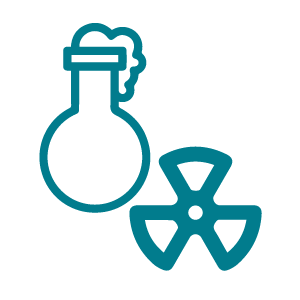

Programme Scope
This workstream collaborates with public health, environmental and response professionals from the UKOTs, providing support and technical assistance to strengthen public health systems and institutions in relation to the International Health Regulations (IHR) and environmental public health.
The aim of the programme’s support is to enhance competencies, coordination and collaboration across the UKOTs to prevent, detect and respond to public health incidents involving chemical and radiation, as well as ‘business-as-usual’ chemicals and radiation hazard management. The programme focuses on improving indicator scores with reference to WHO State Party Annual Reporting (SPAR) Tool and IHR Benchmarks, resulting in greater situational awareness to deliver robust strategies and operational procedures at local and regional levels.
Workstream Focus
The overall aim is to protect UKOT populations from potential environmental public health threats. It seeks to:
-
Improve situational awareness of hazards, risks and associated prioritisation and action planning.
-
Build capacity for chemicals and radiation, including incident response, public health surveillance and risk assessments.
-
Develop workforce through:
- Disseminating good practice ways of working and providing access to sustainable training.
- Engagement with stakeholders, and to establish networks and communities of practice.
- Strengthen multi-sectoral working, including planning and exercising, within and across UKOT stakeholders and the UK government on global public health.
Example Projects
-
Facilitating the development of a framework code of practise for risk management good practise for chemical hazards, working with the UK Health and Safety Executive and a multi-disciplinary steering group. This framework will be available to all territories and cover importation, transportation, storage and storage.
-
Supporting Cayman and Bermuda to develop standards and practices in the use of ionising radiation in healthcare.
-
Virtual environmental public health seminars focused on sharing key challenges and learning on environmental issues involving chemicals and radiation and their actual or potential impacts on UKOT populations (presentations and recordings available on request).
-
Development of a baseline self-assessment toolkit to support UKOTs to conduct assessments to improve situational awareness of potential threats to chemical hazards and health and support any action planning.
-
Development of online training including a foundational course on the principles of chemical hazards and public health.
- Chairing the UK Cross-government Chemicals and Radiation Working Group, which was established by UKHSA and meetings quarterly to support collaboration and communication on mutual areas of work for the strengthening of chemicals and radiation management.
Networks
This network is for anyone in the UKOTs who is interested in the interactions between the environment and public health. The aim of the Network is to provide a forum to share knowledge and experience between territories; discuss and share challenges; discuss relevant good practice, guidance, policies and legislation; support capability and capacity development; share information on resources, events, guidance, research and other relevant information, which supports the above; and identify needs and take action to address these, including through Task and Finish Groups to deliver agreed outputs.
The Network meets once every 3 months using MS Teams, with Task and Finish Groups working on specific objectives and meeting at other times. UKHSA currently provides Chair and Secretariat for the Network. For more information or to join the UKOTs Environmental Public Health Network please email UKOTs.Programme@ukhsa.gov.uk.
Training Opportunities
-
A baseline self-assessment toolkit is currently in development to support the UKOTs to conduct assessments to improve situation awareness of potential threats to chemical hazards and health and support any action planning. These include developing an understanding of hazards and populations potentially at risk by conducting scoping, gap analysis and risk awareness assessments. Online workshops will be used to present the toolkit and to seek feedback to refine the tools. There will be opportunities for UKOTs to pilot use of the toolkit to support its refinement. Please reach out to ukots.programme@ukhsa.gov.uk if you would like to be involved.
-
UKHSA Radiation Safety Training for the Workplace: https://www.ukhsa-protectionservices.org.uk/rpt/courses/
-
IAEA Training Courses: https://www.iaea.org/services/education-and-training/training-courses and IAEA online Learning Management System: https://elearning.iaea.org/m2/course/index.php
Key Resources
-
A framework for mental health and psychosocial support in radiological and nuclear emergencies: https://www.who.int/publications/i/item/9789240015456
-
Chemical Hazards Compendium:https://www.gov.uk/government/collections/chemical-hazards-compendium
-
IHR (2005): https://www.who.int/health-topics/international-health-regulations#tab=tab_3
-
Inspection of Radiation Sources and Regulatory Enforcement: https://www.iaea.org/publications/7627/inspection-of-radiation-sources-and-regulatory-enforcement
-
PHE UK recovery handbook for chemical incidents: https://www.gov.uk/government/publications/uk-recovery-handbook-for-chemical-incidents-and-associated-publications
-
Public Health Protection in Radiation Emergencies: https://assets.publishing.service.gov.uk/government/uploads/system/uploads/attachment_data/file/805655/Advice_for_Radiation_Emergencies_2019.pdf
-
Radiation: PHE-CRCE report series: https://www.gov.uk/government/collections/radiation-phe-crce-report-series
-
The Society of Radiological Protection Public Resources: https://srp-uk.org/resources/resources-for-teachers
-
The UN IOMC Toolbox: https://iomctoolbox.org/
-
UKHSA Radon Group: https://www.ukradon.org/information/
-
UN Strategic Approach to International Chemicals Management (SAICM) communities of practise:https://saicmknowledge.org/communities-practice
-
UN Sustainable Development Goalshttps://sdgs.un.org/goals
-
WHO BENCHMARKS for International Health Regulations (IHR) Capacities: https://www.who.int/publications/i/item/9789241515429
-
WHO Chemical Risk Assessment Network:https://www.who.int/groups/chemical-risk-assessment-network.
-
WHO Chemicals road map: www.who.int/publications/i/item/WHO-FWC-PHE-EPE-17.03
-
WHO Human Health Risk Assessment Toolkit Chemical Hazards, second edition: https://www.who.int/publications/i/item/9789240035720
-
WHO Manual for investigating suspected outbreaks of illnesses of possible chemical etiology: https://www.who.int/publications/i/item/9789240021754
-
WHO Manual for the Public Health Management of Chemical Incidents: https://www.who.int/publications/i/item/9789241598149